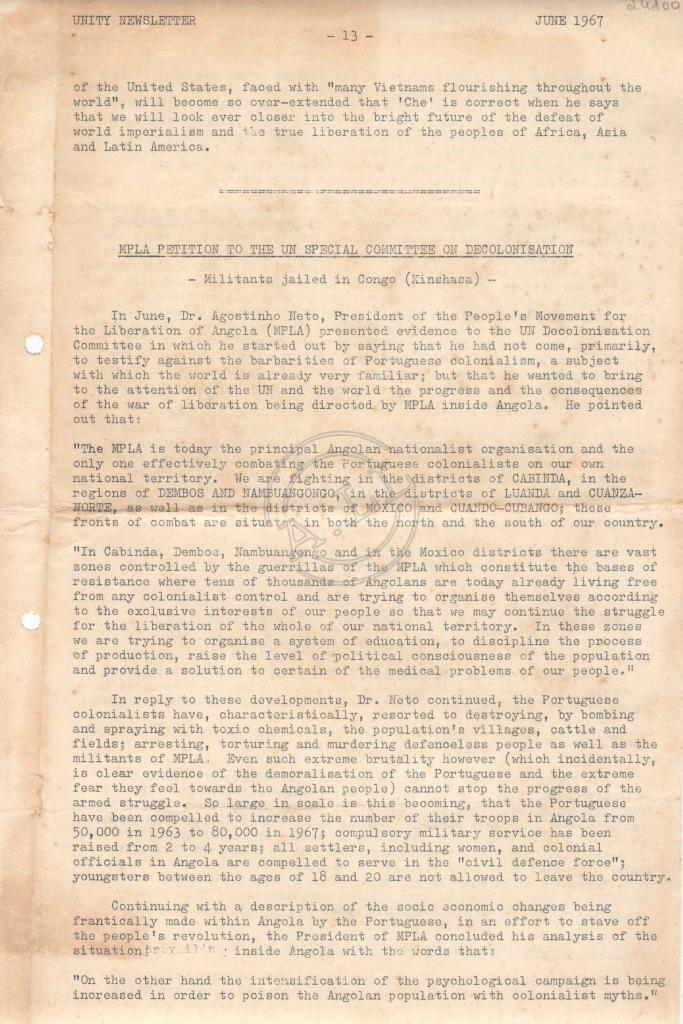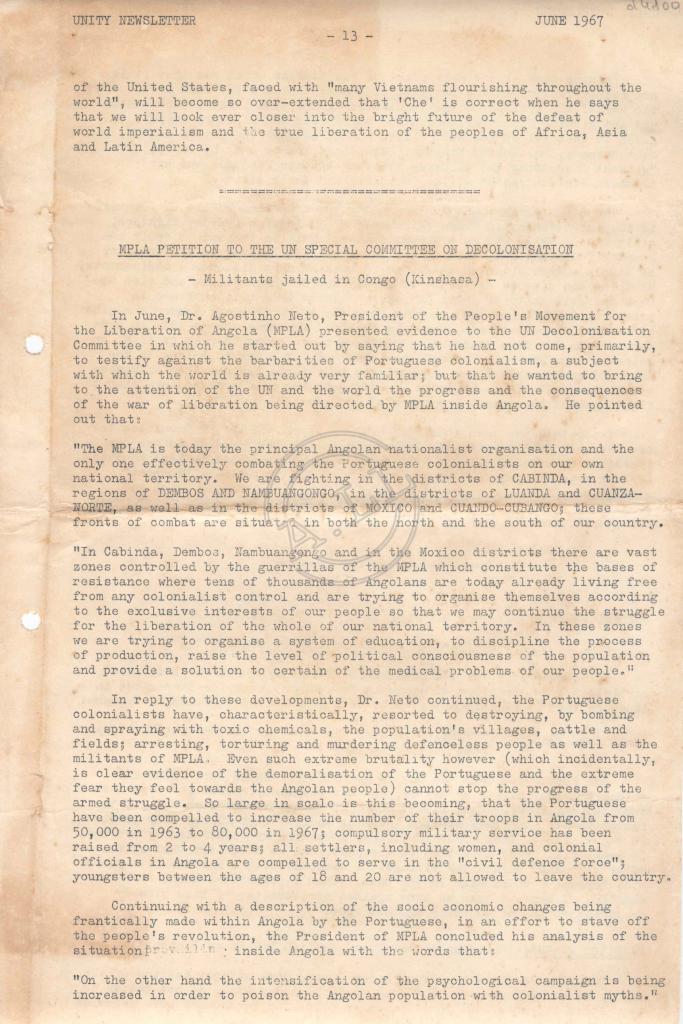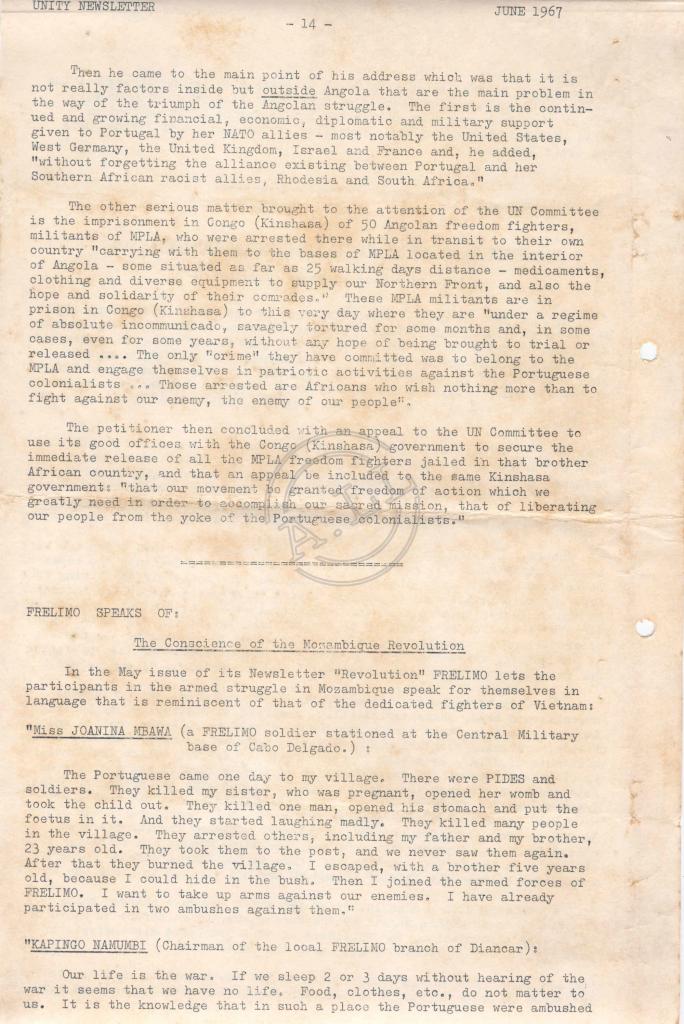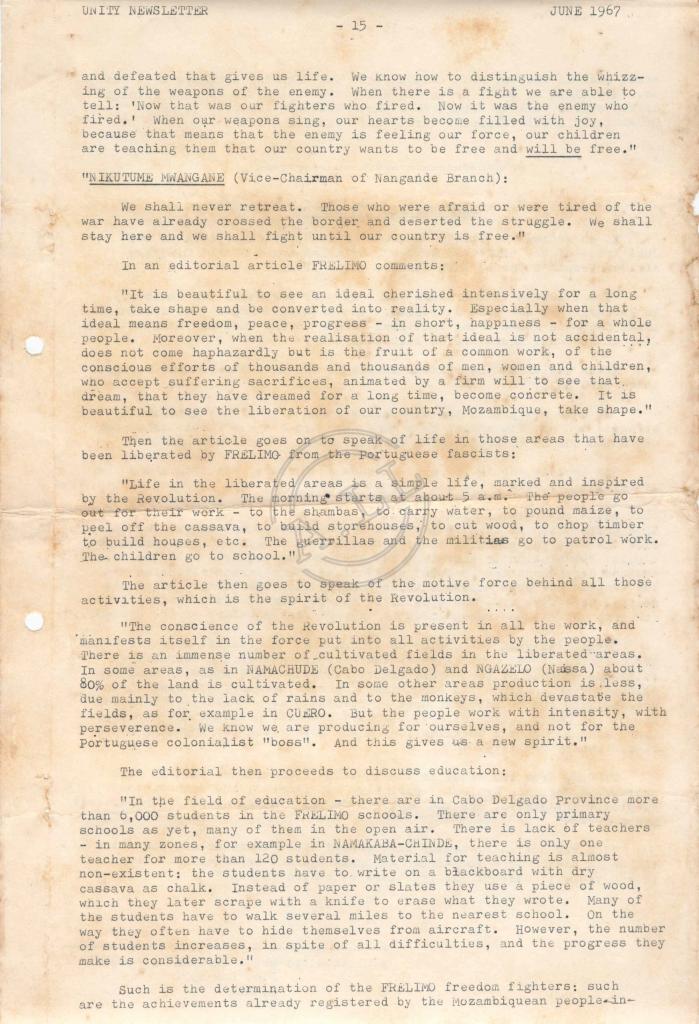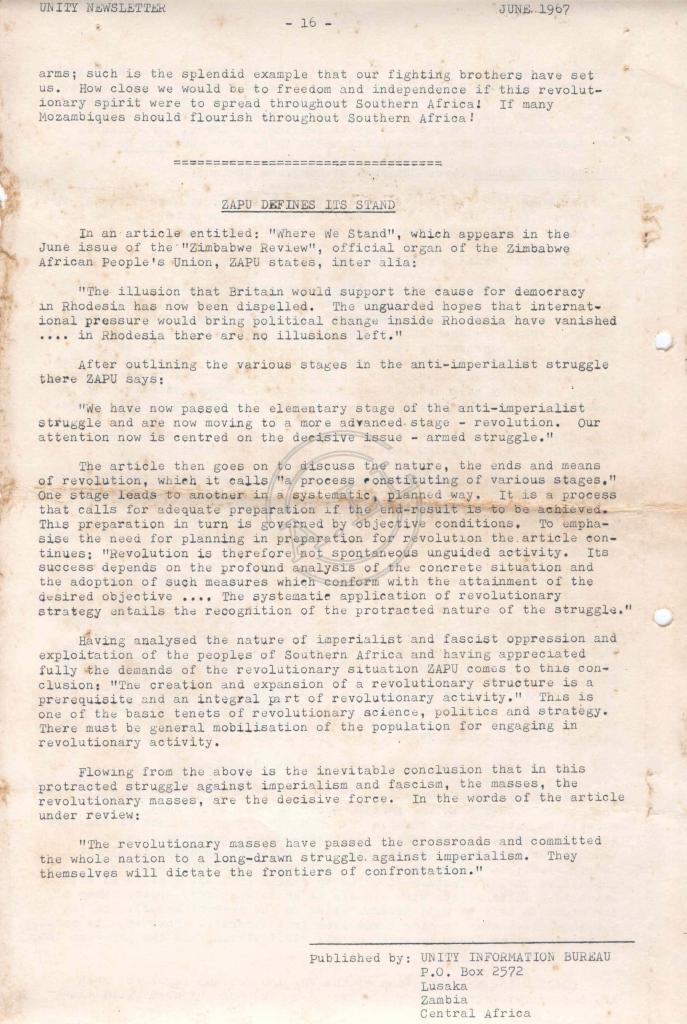Cota
0094.000.008
Tipologia
Notícia
Impressão
Policopiado
Suporte
Papel Comum
Autor
Unity Newsletter
Locais
Data
Jun 1967
Idioma
Conservação
Razoável
Fundo
Imagens
4
UNITY NEWSLETTER [Começa na página 13] JUNE 1967
MPLA PETITON TO THE UN SPECIAL COMMITTEE ON DECOLONISATION
-Militants jailed in Congo (Kinshasa)-
In June, Dr. Agostinho Neto, President of the People’s Movement of the Liberation of Angola (MPLA) presented evidence to the UN Decolonisation Committee in which he started out by saying that he had not come, primarily, to testify against the barbarities of the Portuguese colonialism, a subject with which the world is already very familiar; but that he wanted to bring to the attention of the UN and the world the progress and the consequences of the war of liberation being directed by MPLA inside Angola. He pointed out that:
“The MPLA is today the principal Angolan nationalist organization against and the only one effectively combating the Portuguese colonialists on our own national territory. We are fighting in the districts of CABINDA, in the regions of DEMBOS AND NAMBUANGONGO, in the districts of LUANDA and CUANZA-NORTE, as well in the districts of MOXICO and CUANDO-CUBANGO; these fronts of combat are situated in both the north and the south of our country.
“In Cabinda, Dembos, Nambuangongo and in the Moxico districts there are vast zones controlled by the guerrillas of the MPLA which constitute the bases of resistance where tens of thousands of Angolans are today already living free from any colonialist control and are trying to organise themselves according to the exclusive interests of our people so that we may continue the struggle for the liberation of the whole of our national territory. In these zones we are trying to organise a system of education, to discipline the process of production, raise the level of political consciousness of the population and provide a solution to certain of the medical problems of our people”.
In reply to these developments, Dr. Neto continued, the Portuguese colonialists have, characteristically, resorted to destroying, by bombing and spraying with toxic chemicals, the population’s villages, cattle and fields; arresting, torturing and murdering defenceless people as well as the militants of the MPLA. Even such extreme brutality however (which incidentally, is clear evidence of the demoralization of the Portuguese and the extreme fear they feel towards the Angolan people) cannot stop the progress of the armed struggle. So large in scale is this becoming, that the Portuguese have been compelled to increase the number of their troops in Angola from 50,000 in 1963 to 80,000 in 1967; compulsory military has been raised from 2 to 4 years; all settlers, including women, and colonial officials in Angola are compelled to serve in the “civil defense force”; youngsters between the ages of 18 and 20 are not allowed to leave the country.
Continuing with a description of the socio-economic changes being frantically made withing Angola by the Portuguese, in an effort to stave off the people’s revolution, the President of MPLA concluded his analysis of the situation prevailing; inside Angola with the words that:
“On the other hand the intensification of the psychological campaign is being increased in order to poison the Angolan population with colonialist myths”.
Then he came to the main point of his address which was that it is not really factors inside but outside Angola that are the main problem in the way of triumph of the Angolan struggle. The first is the continued and growing financial, economic, diplomatic and military support given to Portugal by her NATO allies – most notably the United States, West Germany, the United Kingdom, Israel and France and, he added, “without forgetting the alliance existing between Portugal and her Southern African racist allies, Rhodesia and South Africa”.
The other serious matter brought to the attention of the UN Committee is the imprisonment in Congo (Kinshasa) of 50 Angolan freedom fighters, militants of MPLA, who were arrested there while in transit to their own country “carrying with them to the bases of MPLA located in the interior of Angola – some situated as far as 25 walking days distance – medicaments, clothing and diverse equipment to supply our Northern Front, and also the hope and solidarity of their comrades”. These MPLA militants are in prison in Congo (Kinshasa) to this very day where they are “under a regime of absolute incommunicado, savagely tortured of some months and, in some cases, even for some years, without any hope of being brought to trial or released…. The only “crime” they have committed was to belong to the MPLA and engage themselves in patriotic activities against the Portuguese colonialists… Those arrested are Africans who wish nothing more than to fight against our enemy, the enemy of our people”.
The petitioner then concluded with an appeal to the UN Committee to use its good offices with the Congo (Kinshasa) government to secure the immediate release of all the MPLA freedom fighters jailed in that brother African country, and that an appeal be included to the same Kinshasa government: “that our movement be granted freedom of action which we greatly need in order to accomplish our sacred mission, that of liberating our people from the yoke of the Portuguese colonialists”.
FRELIMO SPEAKS OF:
The Conscience of the Mozambique Revolution
In the May issue of its Newsletter “Revolution” FRELIMO lets the participants in the armed struggle in Mozambique speak for themselves in language that is reminiscent of that of the dedicated fighters of Vietnam:
“Miss JOANINA MBAWA (a FRELIMO soldier stationed at the Central Military base of Cabo Delgado.):
The Portuguese came only one day to my village. There were PIDES and soldiers. They killed my sister, who was pregnant, opened her womb and took the child out. They killed one man, opened his stomach and put the foetus in it. An they started laughing madly. They killed many people in the village. They arrested others, including my father and my brother, 23 years old. They took them to the post, and we never saw them again. After that they burned the village. I escaped, with a brother five years old, because I could hide in the bush. Then I joined the armed forces of FRELIMO. I want to take up arms against our enemies. I have already participated in two ambushes against them”.
“KAPINGO NAMUMBI (Chairman of the local FRELIMO branch of Diancar):
Our life is the war. If we sleep 2 or 3 days without hearing of the war it seems that we have no life. Food, clothes, etc., do not matter to us. It is the knowledge that in such a place the Portuguese were ambushed and defeated that gives us life. We know how to distinguish the whizzing of the weapons of the enemy. When there is a fight we are able to tell: ‘Now that was our fighters who fired. Now it was the enemy who fired’. When our weapons sing, our hearts become filled with joy, because that means that the enemy is feeling our force, our children are teaching them that our country wants to be free and will be free”.
“NIKUTUME MWANGANE (Vice-Chairman of Nangande Branch):
We shall never retreat. Those who were afraid or where tired of the war have already crossed the border and deserted the struggle. We shall stay here and we shall fight until our country is free”.
In an editorial article FRELIMO comment:
“It is beautiful to see an ideal cherished intensively for a long time, take shape and be converted into reality. Especially when that ideal means freedom, peace, progress – in short, happiness – for a whole people. Moreover, when the realisation of that ideal is not accidental, does not come haphazardly but is the fruit of a common work, of the conscious efforts of thousands and thousands of men, women and children, who accept suffering sacrifices, animated by firm will to see that dream, that they have dreamed for a long time, become concrete. It is beautiful to see the liberation of our country, Mozambique, take shape”.
Then the article goes on to speak of life in those areas that have been liberated by FRELIMO from the Portuguese fascists:
“Life in the liberated areas is a simple life, marked and inspired by the Revolution. The morning starts at about 5 a.m. The people go out for their work – to the shambas, to carry water, to pound maize, to peel off the cassava, to built storehouses, to cut wood, to chop timber to built houses, etc. The guerrillas and the militias go to patrol work.
The children go to school”.
The article then goes to speak of the motive force behind all those activities, which is the spirit of the Revolution.
“The conscience of the Revolution is present in all the work, and manifests itself in the force put into all activities by the people.
There is an immense number of cultivated fields in the liberated areas.
In some areas, as in NAMACHUDE (Cabo Delgado) and NGAZELO (Naissa) about 80% of the land is cultivated. In some other area production is less, due mainly to the lack of rains and to the monkeys, which devastate the fields, as for example in CUERO. But the people work with intensity, with perseverance. We know we are producing for ourselves, and not for the Portuguese colonialist “boss”. And this gives us a new spirit”.
The editorial then proceeds to discuss education:
“In the field of education – there are in Cabo Delgado Province more than 6,000 students in the FRELIMO schools. There are only primary schools as yet, many of them in the open air. There is lack of teachers in many zones, for example in NAMAKABA-CHIDE, there is only one teacher for more than 120 students. Material for teaching is almost non-existent: the students have to write on a blackboard with dry cassava as chalk. Instead of paper or slates they use a piece of wood, which they later scrape with a knife to erase what they wrote. Many of the students have to walk several miles to the nearest school. On the way they often have to hide themselves from aircraft. However, the number of students increases, in spite of all difficulties, and the progress they make is considerable”.
Such is the determination of the FRELIMO freedom fighters: such are the achievements already registered by the Mozambiquean people in arms; such is the splendid example that our fighting brothers have set us. How close we would be to freedom and independence if this revolutionary spirit were to spread throughout Southern Africa! If many Mozambiques should flourish Southern Africa!
ZAPU DEFINES ITS STAND
In an article entitled: “Where we stand”, which appears in the June issue of the “Zimbabwe Review”, official organ of the Zimbabwe African People’s Union, ZAPU states, inter alia:
“The illusion that Britain would support the cause for democracy in Rhodesia as now been dispelled. The Unguarded hopes that international pressure would bring political change inside Rhodesia have vanished…. in Rhodesia there are no illusions left”.
After outlining the various stages in the anti-imperialist struggle there ZAPU says:
“We have now passed the elementary stage of the anti-imperialist struggle and are now moving to more advanced stage – revolution. Our attention now is centred on the decisive issue – armed struggle”.
The article then goes on to discuss the nature, the ends and means of revolution, which it calls “a process constituting of various stages”. One stage leads to another in a systematic, planned way. It is a process that calls for adequate preparation if the end-result is to be achieved.
This preparation in turn is governed by objective conditions. To emphasise the need for planning in preparation for revolution the article continues: “Revolution is therefore not spontaneous unguided activity. Its success depends on the profound analysis of the concrete situation and the adoption of such measures which conform with the attainment of the desired objective…. The systematic application of revolutionary strategy entails the recognition of the protracted nature of the struggle”.
Having analysed the nature of imperialist and fascist oppression and exploitation of th peoples of Southern Africa and having appreciated fully the demands of the revolutionary situation ZAPU comes to this conclusion: “The creation and expansion of a revolutionary structure is a prerequisite and an integral part of revolutionary activity”. This is one of the basic tenets of revolutionary science, politics and strategy.
There must be general mobilization of the population for engaging in revolutionary activity.
Flowing from the above is the inevitable conclusion that in this protracted struggle against imperialism and fascism, the masses, the revolutionary masses, are the decisive force. In the words of the article under review:
“The revolutionary masses have passed the crossroads and committed the whole nation to a long-drawn struggle against imperialism. They themselves will dictate the frontiers of confrontation”.
Published by: UNITY INFORMATION BUREAU
P. O. Box 2572
Lusaka
Zambia
Central Africa
MPLA PETITON TO THE UN SPECIAL COMMITTEE ON DECOLONISATION
-Militants jailed in Congo (Kinshasa)-
In June, Dr. Agostinho Neto, President of the People’s Movement of the Liberation of Angola (MPLA) presented evidence to the UN Decolonisation Committee in which he started out by saying that he had not come, primarily, to testify against the barbarities of the Portuguese colonialism, a subject with which the world is already very familiar; but that he wanted to bring to the attention of the UN and the world the progress and the consequences of the war of liberation being directed by MPLA inside Angola. He pointed out that:
“The MPLA is today the principal Angolan nationalist organization against and the only one effectively combating the Portuguese colonialists on our own national territory. We are fighting in the districts of CABINDA, in the regions of DEMBOS AND NAMBUANGONGO, in the districts of LUANDA and CUANZA-NORTE, as well in the districts of MOXICO and CUANDO-CUBANGO; these fronts of combat are situated in both the north and the south of our country.
“In Cabinda, Dembos, Nambuangongo and in the Moxico districts there are vast zones controlled by the guerrillas of the MPLA which constitute the bases of resistance where tens of thousands of Angolans are today already living free from any colonialist control and are trying to organise themselves according to the exclusive interests of our people so that we may continue the struggle for the liberation of the whole of our national territory. In these zones we are trying to organise a system of education, to discipline the process of production, raise the level of political consciousness of the population and provide a solution to certain of the medical problems of our people”.
In reply to these developments, Dr. Neto continued, the Portuguese colonialists have, characteristically, resorted to destroying, by bombing and spraying with toxic chemicals, the population’s villages, cattle and fields; arresting, torturing and murdering defenceless people as well as the militants of the MPLA. Even such extreme brutality however (which incidentally, is clear evidence of the demoralization of the Portuguese and the extreme fear they feel towards the Angolan people) cannot stop the progress of the armed struggle. So large in scale is this becoming, that the Portuguese have been compelled to increase the number of their troops in Angola from 50,000 in 1963 to 80,000 in 1967; compulsory military has been raised from 2 to 4 years; all settlers, including women, and colonial officials in Angola are compelled to serve in the “civil defense force”; youngsters between the ages of 18 and 20 are not allowed to leave the country.
Continuing with a description of the socio-economic changes being frantically made withing Angola by the Portuguese, in an effort to stave off the people’s revolution, the President of MPLA concluded his analysis of the situation prevailing; inside Angola with the words that:
“On the other hand the intensification of the psychological campaign is being increased in order to poison the Angolan population with colonialist myths”.
Then he came to the main point of his address which was that it is not really factors inside but outside Angola that are the main problem in the way of triumph of the Angolan struggle. The first is the continued and growing financial, economic, diplomatic and military support given to Portugal by her NATO allies – most notably the United States, West Germany, the United Kingdom, Israel and France and, he added, “without forgetting the alliance existing between Portugal and her Southern African racist allies, Rhodesia and South Africa”.
The other serious matter brought to the attention of the UN Committee is the imprisonment in Congo (Kinshasa) of 50 Angolan freedom fighters, militants of MPLA, who were arrested there while in transit to their own country “carrying with them to the bases of MPLA located in the interior of Angola – some situated as far as 25 walking days distance – medicaments, clothing and diverse equipment to supply our Northern Front, and also the hope and solidarity of their comrades”. These MPLA militants are in prison in Congo (Kinshasa) to this very day where they are “under a regime of absolute incommunicado, savagely tortured of some months and, in some cases, even for some years, without any hope of being brought to trial or released…. The only “crime” they have committed was to belong to the MPLA and engage themselves in patriotic activities against the Portuguese colonialists… Those arrested are Africans who wish nothing more than to fight against our enemy, the enemy of our people”.
The petitioner then concluded with an appeal to the UN Committee to use its good offices with the Congo (Kinshasa) government to secure the immediate release of all the MPLA freedom fighters jailed in that brother African country, and that an appeal be included to the same Kinshasa government: “that our movement be granted freedom of action which we greatly need in order to accomplish our sacred mission, that of liberating our people from the yoke of the Portuguese colonialists”.
FRELIMO SPEAKS OF:
The Conscience of the Mozambique Revolution
In the May issue of its Newsletter “Revolution” FRELIMO lets the participants in the armed struggle in Mozambique speak for themselves in language that is reminiscent of that of the dedicated fighters of Vietnam:
“Miss JOANINA MBAWA (a FRELIMO soldier stationed at the Central Military base of Cabo Delgado.):
The Portuguese came only one day to my village. There were PIDES and soldiers. They killed my sister, who was pregnant, opened her womb and took the child out. They killed one man, opened his stomach and put the foetus in it. An they started laughing madly. They killed many people in the village. They arrested others, including my father and my brother, 23 years old. They took them to the post, and we never saw them again. After that they burned the village. I escaped, with a brother five years old, because I could hide in the bush. Then I joined the armed forces of FRELIMO. I want to take up arms against our enemies. I have already participated in two ambushes against them”.
“KAPINGO NAMUMBI (Chairman of the local FRELIMO branch of Diancar):
Our life is the war. If we sleep 2 or 3 days without hearing of the war it seems that we have no life. Food, clothes, etc., do not matter to us. It is the knowledge that in such a place the Portuguese were ambushed and defeated that gives us life. We know how to distinguish the whizzing of the weapons of the enemy. When there is a fight we are able to tell: ‘Now that was our fighters who fired. Now it was the enemy who fired’. When our weapons sing, our hearts become filled with joy, because that means that the enemy is feeling our force, our children are teaching them that our country wants to be free and will be free”.
“NIKUTUME MWANGANE (Vice-Chairman of Nangande Branch):
We shall never retreat. Those who were afraid or where tired of the war have already crossed the border and deserted the struggle. We shall stay here and we shall fight until our country is free”.
In an editorial article FRELIMO comment:
“It is beautiful to see an ideal cherished intensively for a long time, take shape and be converted into reality. Especially when that ideal means freedom, peace, progress – in short, happiness – for a whole people. Moreover, when the realisation of that ideal is not accidental, does not come haphazardly but is the fruit of a common work, of the conscious efforts of thousands and thousands of men, women and children, who accept suffering sacrifices, animated by firm will to see that dream, that they have dreamed for a long time, become concrete. It is beautiful to see the liberation of our country, Mozambique, take shape”.
Then the article goes on to speak of life in those areas that have been liberated by FRELIMO from the Portuguese fascists:
“Life in the liberated areas is a simple life, marked and inspired by the Revolution. The morning starts at about 5 a.m. The people go out for their work – to the shambas, to carry water, to pound maize, to peel off the cassava, to built storehouses, to cut wood, to chop timber to built houses, etc. The guerrillas and the militias go to patrol work.
The children go to school”.
The article then goes to speak of the motive force behind all those activities, which is the spirit of the Revolution.
“The conscience of the Revolution is present in all the work, and manifests itself in the force put into all activities by the people.
There is an immense number of cultivated fields in the liberated areas.
In some areas, as in NAMACHUDE (Cabo Delgado) and NGAZELO (Naissa) about 80% of the land is cultivated. In some other area production is less, due mainly to the lack of rains and to the monkeys, which devastate the fields, as for example in CUERO. But the people work with intensity, with perseverance. We know we are producing for ourselves, and not for the Portuguese colonialist “boss”. And this gives us a new spirit”.
The editorial then proceeds to discuss education:
“In the field of education – there are in Cabo Delgado Province more than 6,000 students in the FRELIMO schools. There are only primary schools as yet, many of them in the open air. There is lack of teachers in many zones, for example in NAMAKABA-CHIDE, there is only one teacher for more than 120 students. Material for teaching is almost non-existent: the students have to write on a blackboard with dry cassava as chalk. Instead of paper or slates they use a piece of wood, which they later scrape with a knife to erase what they wrote. Many of the students have to walk several miles to the nearest school. On the way they often have to hide themselves from aircraft. However, the number of students increases, in spite of all difficulties, and the progress they make is considerable”.
Such is the determination of the FRELIMO freedom fighters: such are the achievements already registered by the Mozambiquean people in arms; such is the splendid example that our fighting brothers have set us. How close we would be to freedom and independence if this revolutionary spirit were to spread throughout Southern Africa! If many Mozambiques should flourish Southern Africa!
ZAPU DEFINES ITS STAND
In an article entitled: “Where we stand”, which appears in the June issue of the “Zimbabwe Review”, official organ of the Zimbabwe African People’s Union, ZAPU states, inter alia:
“The illusion that Britain would support the cause for democracy in Rhodesia as now been dispelled. The Unguarded hopes that international pressure would bring political change inside Rhodesia have vanished…. in Rhodesia there are no illusions left”.
After outlining the various stages in the anti-imperialist struggle there ZAPU says:
“We have now passed the elementary stage of the anti-imperialist struggle and are now moving to more advanced stage – revolution. Our attention now is centred on the decisive issue – armed struggle”.
The article then goes on to discuss the nature, the ends and means of revolution, which it calls “a process constituting of various stages”. One stage leads to another in a systematic, planned way. It is a process that calls for adequate preparation if the end-result is to be achieved.
This preparation in turn is governed by objective conditions. To emphasise the need for planning in preparation for revolution the article continues: “Revolution is therefore not spontaneous unguided activity. Its success depends on the profound analysis of the concrete situation and the adoption of such measures which conform with the attainment of the desired objective…. The systematic application of revolutionary strategy entails the recognition of the protracted nature of the struggle”.
Having analysed the nature of imperialist and fascist oppression and exploitation of th peoples of Southern Africa and having appreciated fully the demands of the revolutionary situation ZAPU comes to this conclusion: “The creation and expansion of a revolutionary structure is a prerequisite and an integral part of revolutionary activity”. This is one of the basic tenets of revolutionary science, politics and strategy.
There must be general mobilization of the population for engaging in revolutionary activity.
Flowing from the above is the inevitable conclusion that in this protracted struggle against imperialism and fascism, the masses, the revolutionary masses, are the decisive force. In the words of the article under review:
“The revolutionary masses have passed the crossroads and committed the whole nation to a long-drawn struggle against imperialism. They themselves will dictate the frontiers of confrontation”.
Published by: UNITY INFORMATION BUREAU
P. O. Box 2572
Lusaka
Zambia
Central Africa
«MPLA petition to the Special Committee on decolonisation»; «FRELIMO speaks of: The Conscience of Mozambique Revolution»; «ZANU defines its stand» (Lusaka, Junho 1967).
A publicação, total ou parcial, deste documento exige prévia autorização da entidade detentora.
